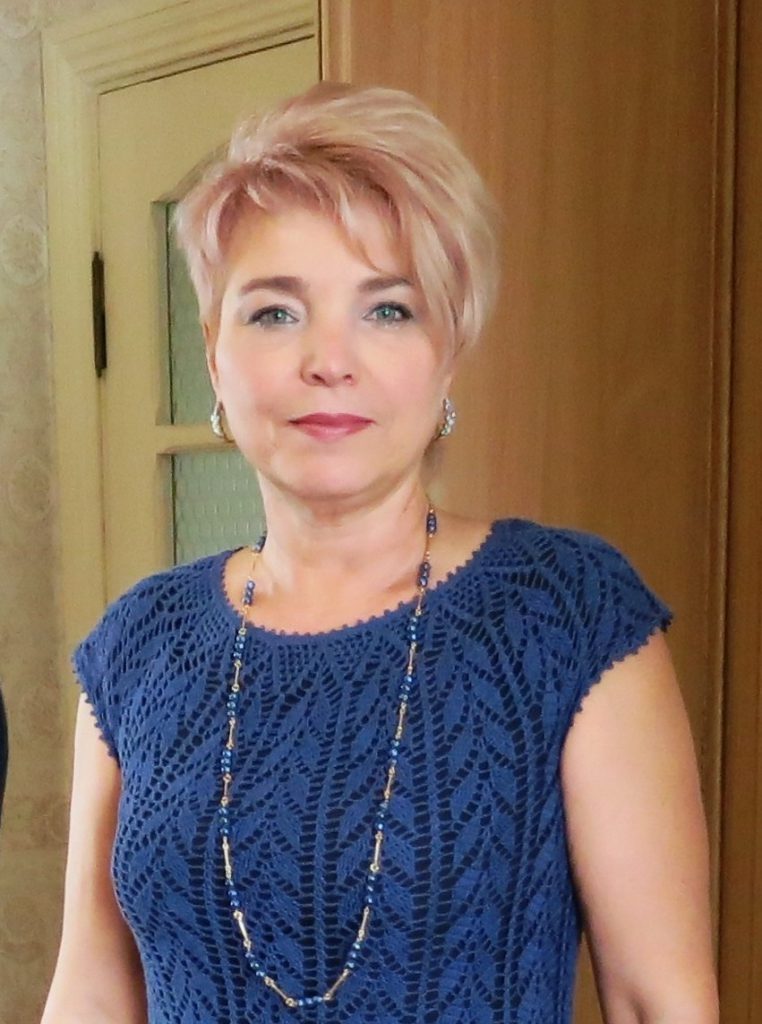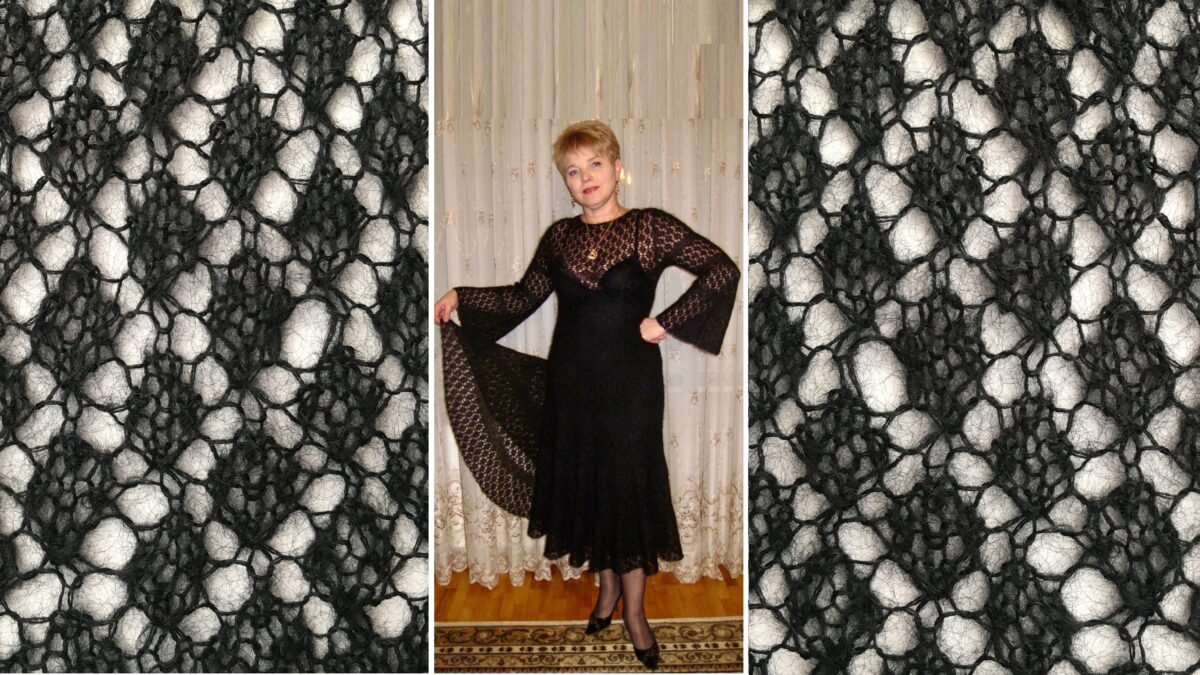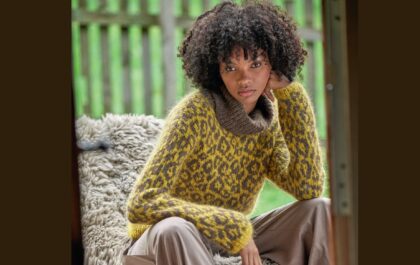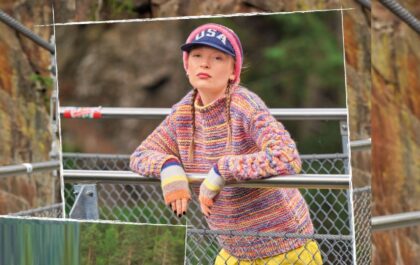
Shetland knitting, Shetland patterns. Shetland - all these are the names of a recently popular knitting trend, which is based on the famous openwork Shetland patterns.
If you knit even a little, be sure to give Shetland openwork a try, because a real immersion in Shetland knitting can not only change your entire understanding of knitting, but can also become a real hobby.
If you like to knit on circular needles, then knitting garter stitch becomes not very convenient, since you have to knit purl stitches in purl rows. Therefore, many knitters knit Shetland patterns using stockinette stitch, which, however, does not make them any less beautiful and impressive.

The dress is knitted in two threads:
– Italian yarn art. Camelot 1000m/100g (67% superkid mohair, 3% wool, 30% polyamide) – 170g
– Italian yarn Cariagi art. Jaipur 2800m/100g (70% cashmere, 30% mimosa silk) – 55g
– Addi knitting needles on fishing line 2.5 – 3.0 – 3.5 mm
– Clover hook 2.0mm
Finished product weight -225g
The dress is knitted in parts. The first part - the skirt of the dress is knitted from the waist down.
Then from the waist up - the bodice of the dress.
The sleeves are knitted straight from the armholes from top to bottom.
To work on a dress, you need to knit samples and decide on the calculations.
It is also necessary to create a pattern for the top of the dress. For the skirt, you only need control measurements of the waist and hips. Skirt A - silhouette.
The dress is knitted with stripes of garter stitch and openwork diamonds.
All increases occur in garter stitch.
Diamond patterns are all good, but since the yarn is black, there is no point in being tricky.
Scheme of openwork rhombuses from the book “Heirloom knitting” by S. Miller.
All Shetland knitting patterns from Shetland lacemaker Sharon Miller's book are located here***

The scheme has been redone. The new diagram shows only the front rows. Purl rows - knit stitches.
Diamond pattern repeat – 6 loops

Basic pattern “Lacy rhombuses”

Description of dress for size 46-48
We start knitting from the waist. Using waste thread, we cast on needles No. 3 144p and knit several rows.
We switch to knitting with the main thread and close the knitting in a circle. Make sure that the knitting does not twist.
We knit in circles in turning rows. Knitting in all rows with facial loops - garter stitch.
1st lane – knitting needles No. 3 – 144p
We knit 10 rubles. – 3cm in garter stitch.
Openwork rhombuses – 24p – 9 cm (5 diamonds diagonally) – 144p: 6p = 24 repeats
To move to the 2nd lane, we make a calculation.
Every 3p we make 1 yarn over, i.e. add 48p = 144p: 3p
2nd lane – knitting needles No. 3 – 192p = 144p + 48p
Garter stitch 10p (in the first row there is an increase - every 3 stitches we make 1 yarn over).
Openwork rhombuses – 36r – 13cm (7 diamonds diagonally) 192p: 6p = 32 repeats
Calculation for moving to the 3rd lane.
Every 3 loops we make 1 yarn over, i.e. add 64p = 192p: 3p
For a diamond pattern, the number of stitches should be a multiple of 6.
Let's add another 2p. 192p + 64p +2p = 258p
3rd lane – knitting needles No. 3.5 – 258p
Garter stitch 10p (in the first row there is an increase - every 3 stitches we make 1 yarn over and 2 more increases).
Openwork rhombuses – 36r (7 diamonds diagonally) -258p: 6p = 43 repeats
Calculation for moving to the 4th lane.
Every 3 loops we make 1 yarn over, i.e. add 86p = 258p: 3p
For a diamond pattern, the number of loops should be a multiple of 6 stitches, i.e. do not knit 2 yarn overs. Total increases 84p.

4th lane – knitting needles No. 3.5 – 342p = 258p + 84p
Garter stitch 10p (in the first row there is an increase - every 3 stitches we make 1 yarn over, we do not knit the last two yarn overs).
Openwork rhombuses – 36p (7 diamonds diagonally) – 342p: 6p = 57 repeats
Calculation for moving to the 5th lane.
Every 3 loops we make 1 yarn over, i.e. add 114p = 342p: 3p
5th lane knitting needles No. 4.0 – 456p = 342p + 114p
Garter stitch 10p (in the first row there is an increase - every 3 stitches we make 1 yarn over).
Openwork rhombuses – 28r (5 diamonds diagonally) – 456p: 6p = 76 repeats
We close the loops of the bottom of the skirt with hook No. 2 as follows:
*3p together, 8p* – repeat until the end of the row.
Dress skirt length 77cm.
Processing the hem of the dress

Let's move on to working on the bodice of the dress.
We unravel the waste thread and cast on circular needles No. 2.5 - 144 sts.
In the first row we evenly decrease 12 stitches.
On the knitting needles 132p: 6p = 22 repeats of openwork rhombuses. We knit according to the pattern of openwork diamonds - 16p - 2 diamonds diagonally and switch to knitting needles No. 3.0 and knit 2 more diamonds diagonally. We switch to needles No. 3.5 and knit 4 diamonds. Only 40 rubles - 8 diagonal diamonds from the waist.
Next 10p in garter stitch. From waist to armhole – 18cm.
As an option: you can knit the top of the dress without a stripe of a garter pattern. Then we knit 52r -11 openwork diamonds diagonally.
We divide the knitting into front and back.
In the undercuts, remove 6 loops per waste thread. In work 132p:2 = 66p – 6p = 60p +2 edge (from broach).
We knit the front and back the same way - 20cm to the shoulder (boat neckline) - this is 52r - 11 openwork diamonds diagonally. We close the loops with hook No. 2.0 as follows: * 3 loops together, 7 VP * - you get 19 arches. The backrest can be increased by one diamond, i.e. knit another 4p.
In the process of closing the loops on the back, we connect 5 arches on each side. Do not break the thread, check the size of the neckline.
Shoulder seam and beginning of sleeve cap

There are 9 arches left for the neck.
As an option: you can knit a stand-up collar. To do this, on arches on circular knitting needles, you need to cast on loops for 12 repeats and knit 2 openwork diamonds diagonally on 72 loops.
Stand collar

Let's move on to knitting sleeves from the armhole from top to bottom. We knit with needles No. 3.5
For a sleeve at its widest point, you need 60 loops - 38cm. We cast these loops along the entire armhole edge from the front and back edge loops and attach the hem loops.
We start knitting with 12 loops of the sleeve cap, i.e. 6 loops on each side of the shoulder. We knit 40 rows, adding one loop 16 times in each row and 2 times 2 stitches on each side. And at the end we attach 3p undercuts.
Calculation: 1 x 6p; 16 x 1p; 2 x 2p; 1 x 3p. 20 increases were made - 29p x 2 = 58p + 2 p from broaches. = 60p
This is what the seam connecting the sleeve to the armhole looks like

Next, we knit a sleeve, from the armhole down, to the required length of three stripes.
1st lane – 60p – 10 rapports.
We knit 10p in garter stitch.
Pattern of openwork rhombuses – 36r (7 diamonds diagonally)
To move to the second lane, we make a calculation. To expand the sleeve, add 12 loops. 60p: 12p = 5p Every 5p we knit 1p from the broach.
2nd lane – 72p – 12 rapports
10p in garter stitch – in the 1st row we make increases.
Openwork rhombuses – 36r (7 diamonds diagonally)
Moving to the 3rd stripe - add 12p. 72p: 12p = 6p Every 6p we knit 1p from the broach
3rd lane – 84p – 14 rapports
10p in garter stitch – in the 1st row we make increases.
Openwork rhombuses – 36r (7 diamonds diagonally)
We close the sleeve loops with hook No. 2 as follows:
*3p together, 7VP* – repeat until the end of the row.

Wash the finished dress and dry it flat. Then - CAUTION! - pet.
Thank you for watching!
Related posts
2 Comments
Leave a Reply Cancel reply
About the Author

Welcome !
My name is Lilia. The main hobby of my life is knitting. I started with knitting needles and switched to a knitting machine. In 1988 I got acquainted with crochet - Romanian lace. About 10 years ago I became interested in Irish lace and Shetland knitting. And now I’m trying fillet crochet. On this site I want to share with you my 45 years of experience in various knitting techniques.
Latest publications
Жаккардовый пуловер леопардовым узором BUDDIE
Пуловер ВАВЕТТ
Пестрый пуловер с «косами» BASTIA
Blog Subscription
Be the first to receive new items!




Thank you for your work.
Thanks a lot